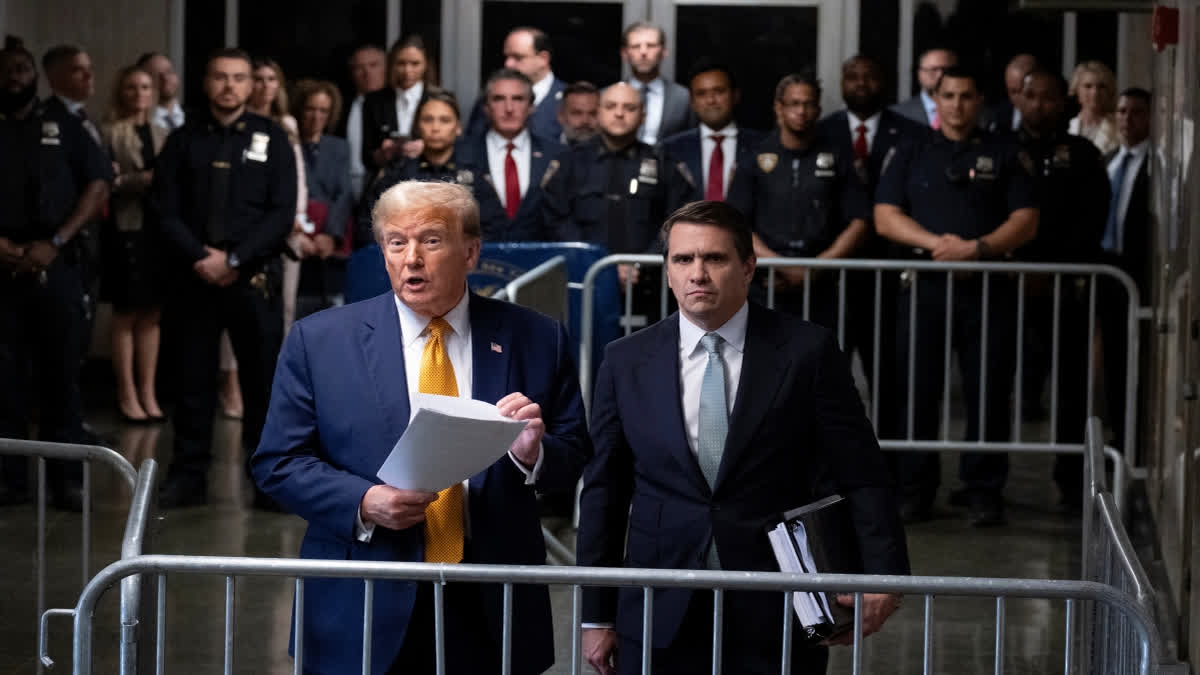New York: A judge on Tuesday put off a key ruling in President-elect Donald Trump’s hush money case as his lawyers argued for dismissing it so he can run the country.
New York Judge Juan M. Merchan had been set to rule Tuesday on their earlier request to throw out Trump's historic conviction for a different reason — because of a U.S. Supreme Court ruling this summer on presidential immunity. Instead, Merchan told Trump's lawyers he'd halt proceedings and delay the ruling until at least Nov. 19 so that prosecutors can give their view of what to do in light of the former and future president's election win last week.
Trump's lawyers and prosecutors had agreed in recent days to the one-week postponement, according to emails filed in court Tuesday. Because of the “unprecedented circumstances,” prosecutors need to consider how to balance the “competing interests” of the jury's verdict and the presidency, prosecutor Matthew Colangelo wrote.
Trump lawyer Emil Bove, meanwhile, argued that throwing out the case is “necessary to avoid unconstitutional impediments to President Trump's ability to govern.” Trump campaign spokesperson Steven Cheung heralded the delay, and said the president-elect's win makes it “abundantly clear that Americans want an immediate end to the weaponization of our justice system, including this case, which should have never been filed.”
Prosecutors declined to comment.
A jury convicted Trump in May of falsifying business records related to a $130,000 payment to porn actor Stormy Daniels in 2016. The payout was to buy her silence about claims that she had sex with Trump. Trump says they didn’t have sex, denies any wrongdoing and maintains the prosecution was a political tactic meant to harm his latest campaign. Trump is a Republican. Manhattan District Attorney Alvin Bragg, whose office brought the case, is a Democrat, as is Merchan.
Just over a month after the verdict, the Supreme Court ruled that ex-presidents can’t be prosecuted for actions they took in the course of running the country, and prosecutors can’t cite those actions even to bolster a case centered on purely personal conduct.
Trump’s lawyers cited that ruling to argue that the hush money jury got some evidence it shouldn't have, such as Trump’s presidential financial disclosure form and testimony from some White House aides.
Prosecutors disagreed and said the evidence in question was only “a sliver” of their case. Trump's criminal conviction was a first for any ex-president. It left the 78-year-old facing the possibility of a fine, probation or up to four years in prison. The case centered on how Trump accounted for reimbursing his personal attorney for the Daniels payment.
The lawyer, Michael Cohen, fronted the money. He later recouped it through a series of payments that Trump’s company logged as legal expenses. Trump, by then in the White House, signed most of the checks himself. Prosecutors said the designation was meant to cloak the true purpose of the payments and help cover up a broader effort to keep voters from hearing unflattering claims about the Republican during his first campaign.
Trump said that Cohen was legitimately paid for legal services, and that Daniels’ story was suppressed to avoid embarrassing Trump’s family, not to influence the electorate. Trump was a private citizen — campaigning for president, but neither elected nor sworn in — when Cohen paid Daniels in October 2016. He was president when Cohen was reimbursed, and Cohen testified that they discussed the repayment arrangement in the Oval Office.
Trump has been fighting for months to overturn the verdict. While urging Merchan to nix the conviction, the president-elect also has been trying to move the case to federal court. Before the election, a federal judge repeatedly said no to the move, but Trump has appealed.
Trump faces three other unrelated indictments in various jurisdictions.
But Justice Department special counsel Jack Smith has been evaluating how to wind down both the 2020 election interference case and the separate classified documents case against Trump before he takes office, a person familiar with the matter told The Associated Press. The person spoke on condition of anonymity because they were not authorized to discuss the matter publicly. Longstanding Justice Department policy says sitting presidents cannot be prosecuted.
Meanwhile, a Georgia election interference case against Trump is largely on hold while Trump and other defendants appeal a judge’s ruling allowing the top prosecutor on that case, Fani Willis, to continue prosecuting it.



